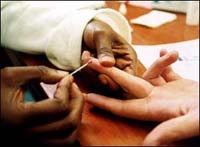Government backs routine HIV testing
Testing for HIV should be a routine part of doctor appointments and emergency-room visits for all patients between ages 13 and 64, according to new federal guidelines designed to identify AIDS patients before they develop life-threatening symptoms.

The policy may be difficult to implement, especially in Illinois, where the law sets tight standards for how doctors must obtain consent for HIV tests and how they can inform patients of the results.
Supporters of the new recommendations, released Thursday by the federal Centers for Disease Control and Prevention, said more widespread testing would improve care for the estimated 250,000 Americans who don't know they're infected. It also could help reduce the spread of the disease by up to 30 percent, since studies show that carriers of HIV cut back on high-risk behavior, such as unprotected sex, once they learn of the infection, reports Chicago Tribune.
According to Baltimore Sun, routine tests would reach many of the estimated 250,000 people in the U.S. who unknowingly carry the virus that causes AIDS, Dr. Julie L. Gerberding, the CDC director, said in a conference call. They account for a quarter of infected Americans, according to government estimates.
"We believe that when they know, they will take steps to protect themselves and their partners," Gerberding said. Early diagnosis can also help people start treatment before their condition is advanced and harder to treat, officials said.
"It is simply not acceptable for HIV-infected individuals to visit a health care facility without being able to learn they have a life-threatening infection," added Dr. Kevin Fenton, acting director of CDC's division of HIV and sexually transmitted disease prevention.
Dr. Richard Boehler, chief medical officer of St. Joseph Medical Center in Towson, said patients are routinely asked to sign releases that give insurance companies broad access to test results. Savvy patients can exclude certain tests from outside inspection by indicating so on the forms.
By and large, doctors and health care organizations praised the CDC's action, saying that wider testing will help stem the epidemic and combat the perception that HIV is limited to certain risk groups such as drug users.
"I think some people assume, inappropriately, that HIV is only a disease of certain classes of individuals," said Boehler. "We know from managing patients in the hospital that HIV does exist and occur in those that we'd consider lower risk."
Subscribe to Pravda.Ru Telegram channel, Facebook, RSS!


